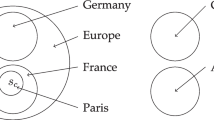Abstract
The received view about meteorological predicates like ‘rain’ is that they carry an argument slot for a location which can be filled explicitly or implicitly. The view assumes that ‘rain’, in the absence of an explicit location, demands that the context provide a specific location. In an earlier article in this journal, I provided a counter-example, viz. a context in which ‘it is raining’ receives a location-indefinite interpretation. On the basis of that example, I argued that when there is tacit references to a location, it takes place for pragmatic reasons and casts no light on the semantics of meteorological predicates. Since then, several authors have reanalysed the counter-example, so as to make it compatible with the standard view. I discuss those attempts and argue that my account is superior.
Similar content being viewed by others
References
Bierwisch M. (1982) Formal and lexical semantics. Linguistische Berichte 80: 3–17
Bierwisch M. (1989) The semantics of gradation. In: Bierwisch M., Lang E. (eds). Dimensional adjectives. Springer, Berlin, pp. 71–261
Capone A. (2005) Review of Literal Meaning. Journal of Linguistics 341: 45–49
Copestake A., Briscoe T. (1992) Lexical operations in a unification based framework. In: Pustejovsky J., Bergler S. (eds). Lexical semantics and knowledge representation. Springer, Berlin, pp. 101–119
Crimmins M. (1992) Talk about belief. MIT Press/Bradford Books, Cambridge, MA
Fillmore C. (1969) Types of lexical information. In: Kiefer F. (eds). Studies in syntax and semantics. Reidel, Dordrecht, pp. 109–137
Fillmore C. (1986) Pragmatically controlled zero anaphora. Proceedings of the Annual Meeting of the Berkeley Linguistics Society 12: 95–107
Fillmore C. (1997) Lectures on deixis. CSLI Publications, Stanford
Gardent C. (2005) Interprétations minimales et interprétations maximales. In: Corblin F., Gardent C. (eds). Interpréter en Contexte. Lavoisier, Paris, pp. 279–303
Lasersohn P. (1999) Pragmatic Halos. Language 75: 522–551
Marti L. (2006) Unarticulated constituents revisited. Linguistics and Philosophy 29: 135–166
McConnell-Ginet S. (1982) Adverbs and logical form. Language 58: 144–184
Mitchell, J. (1987). The formal semantics of point of view. PhD Dissertation, Department of Linguistics, University of Massachussetts.
Neale, S. (forthcoming). On Location. In M. O’Rourke & C. Washington (Eds.), Situating semantics: Essays on the philosophy of John Perry. Cambridge, MA: MIT Press.
Nunberg, G. (1992). Two kinds of indexicality. In C. Barker, & D. Dowty (Eds.), Proceedings of SALT II, The Ohio State University, Working Papers in Linguistics n°. 40 (pp. 283–301).
Nunberg, G., & Zaenen, A. (1992). Systematic polysemy in lexicology and lexicography. In H. Tommola, et al. (Eds.) Proceedings of Euralex 2, University of Tampere, Part II (pp. 387–398).
Partee, B. (1973). Some structural analogies between tenses and pronouns in English. Journal of Philosophy, 70, 601–609. Reprinted in Partee 2004, pp. 50–58.
Partee, B. (1984). Compositionality. In F. Landman, F. Veltman (Eds.). Varieties of formal semantics (pp. 281–312). Dordrecht: Foris. Reprinted in Partee 2004, 153–181.
Partee, B. (1989). Binding implicit variables in quantified contexts. CLS, 25, 342–365. Reprinted in Partee 2004, 259–281.
Partee B. (2004) Compositionality in formal semantics. Blackwell, Oxford
Perry, J. (1986/2000). Thought without representation. Reprinted in The problem of the essential indexical and other essays, expanded edition, (pp. 171188). Stanford: CSLI Publications.
Quine, W. V. O. (1960/1995). Variables explained away. In his Selected Logic Papers (pp. 227–235). Cambridge: Harvard University Press.
Recanati, F. (2001). Implicit arguments and other unarticulated constituents. Communication to SPR 1, Donostia-San Sebastian, 23 November 2001.
Recanati F. (2002) Unarticulated constituents. Linguistics and Philosophy 25: 299–345
Recanati F. (2004) Literal meaning. Cambridge University Press, Cambridge
Sgall P., Hajicova E., Panevova J. (1986) The meaning of the sentence in its semantic and pragmatic aspects. Reidel, Dordrecht
Stanley J. (2000) Context and logical form. Linguistics and Philosophy 23: 391–434
Stanley, J. (2005). Review of Literal Meaning. In Notre Dame philosophical reviews, online at http://ndpr.nd.edu/.
Strawson P. (1997) Entity and identity. Clarendon Press, Oxford
Taylor K. (2001) Sex, breakfast, and descriptus interruptus. Synthese 128: 45–61
Tesnière L. (1959) Eléments de Syntaxe Structurale. Klincksieck, Paris
Author information
Authors and Affiliations
Corresponding author
Additional information
I am indebted to Luisa Marti, Paul Elbourne, and the participants in my graduate seminar at Harvard University (fall, 2004), especially Pranav Anand, for discussions that led to this paper. Thanks are also due to Philippe Schlenker and, again, to Paul Elbourne for comments on a first draft. A second draft benefitted from comments by Luisa Marti, Eros Corazza, Polly Jacobson, Jason Stanley, and an anonymous referee for this journal who provided exceptionally detailed remarks and suggestions. Those remarks and suggestions led me to expand the paper considerably in response—so much so that the third draft was no longer publishable as a journal article. The present paper corresponds roughly to the first half of the expanded version.
Rights and permissions
About this article
Cite this article
Recanati, F. It is raining (somewhere). Linguistics & Philosophy 30, 123–146 (2007). https://doi.org/10.1007/s10988-006-9007-1
Received:
Accepted:
Published:
Issue Date:
DOI: https://doi.org/10.1007/s10988-006-9007-1




